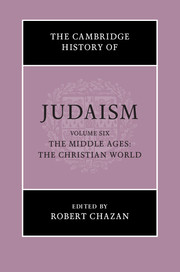Book contents
- The Cambridge History of Judaism
- The Cambridge History of Judaism
- The Cambridge History of Judaism
- Copyright page
- Contents
- Figures
- Introduction
- Part I Jews in the Medieval Christian World
- Chapter 1 The Prior Church Legacy
- Chapter 2 Medieval Church Doctrines and Policies
- Chapter 3 Mutual Perceptions and Attitudes
- Chapter 4 Byzantium
- Chapter 5 Italy
- Chapter 6 The Iberian Peninsula
- Chapter 7 Southern France
- Chapter 8 Northwestern Europe
- Chapter 9 Germany
- Chapter 10 Northeastern Europe
- Part II Social and Institutional History
- Part III Spiritual and Intellectual History
- Suggested Readings
- Index
Chapter 2 - Medieval Church Doctrines and Policies
from Part I - Jews in the Medieval Christian World
Published online by Cambridge University Press: 01 October 2018
- The Cambridge History of Judaism
- The Cambridge History of Judaism
- The Cambridge History of Judaism
- Copyright page
- Contents
- Figures
- Introduction
- Part I Jews in the Medieval Christian World
- Chapter 1 The Prior Church Legacy
- Chapter 2 Medieval Church Doctrines and Policies
- Chapter 3 Mutual Perceptions and Attitudes
- Chapter 4 Byzantium
- Chapter 5 Italy
- Chapter 6 The Iberian Peninsula
- Chapter 7 Southern France
- Chapter 8 Northwestern Europe
- Chapter 9 Germany
- Chapter 10 Northeastern Europe
- Part II Social and Institutional History
- Part III Spiritual and Intellectual History
- Suggested Readings
- Index
Summary
- Type
- Chapter
- Information
- The Cambridge History of Judaism , pp. 32 - 53Publisher: Cambridge University PressPrint publication year: 2018

